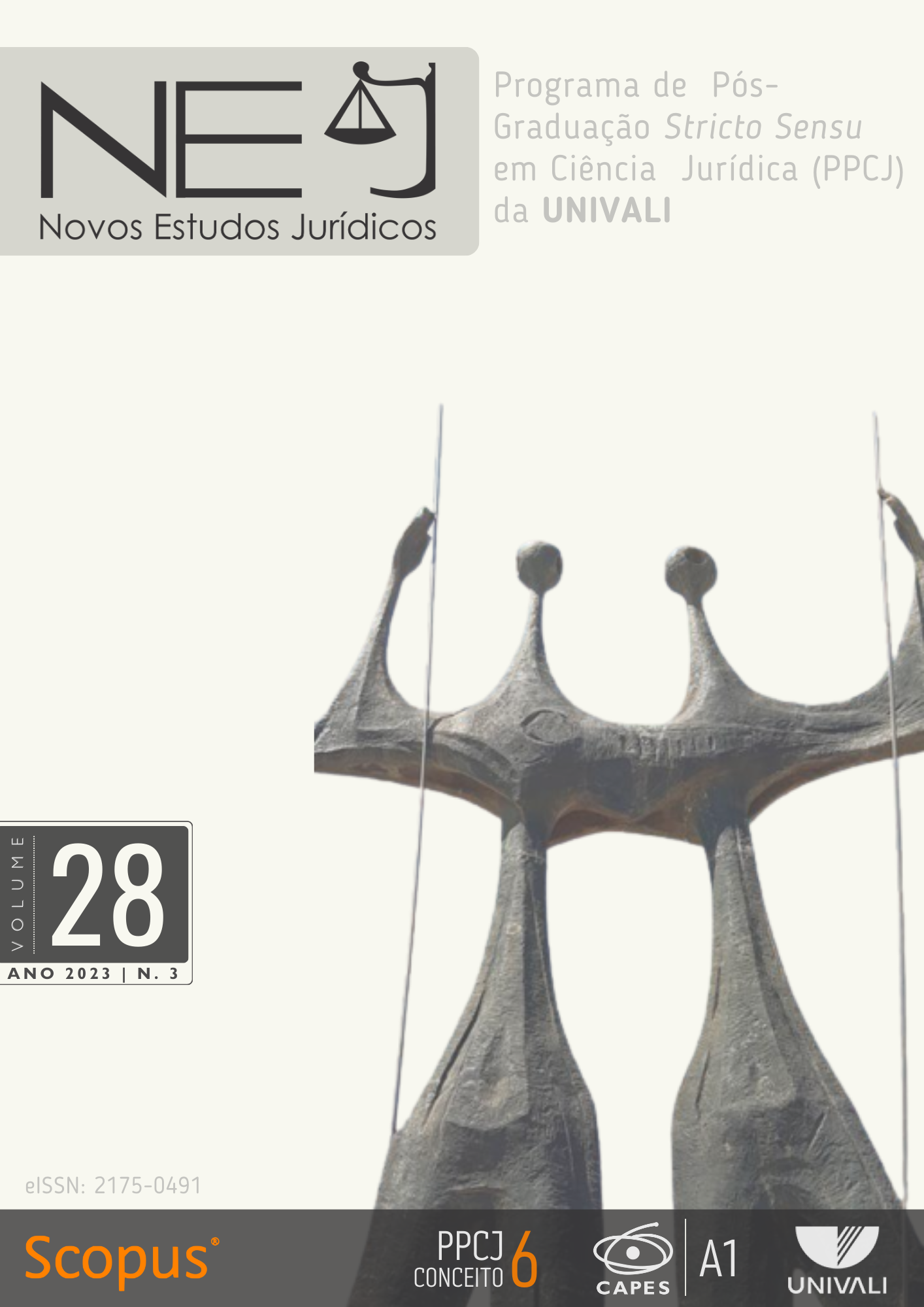CONTRAMAYORITARIAN DIFFICULTY: PRECARIOUS LEGISLATOR OR EMPOWERED JUDGE
DOI:
https://doi.org/10.14210/nej.v28n3.p686-699Keywords:
Legislator, Judge, Supreme Court, ContramayoritarianAbstract
Contextualization: Part of the countermajoritarian argument is used to justify the actions of our Constitutional Courts. This changes the traditional location of the judiciary. Since the rulings of judges, especially those of constitutional jurisdiction, become crucial elements of public discussion. This implies that our judges are no longer members of that branch of public power that is despised or less valued to become protagonists of public discussion.
Objective: This work, from the analysis of cases, proposes how the new conception of the constitutional norm and the amparo trial interact. To achieve the above, an analysis will be conducted to establish some of the descriptive notes of neoconstitutionalism.
Methodology: The deductive method is used to locate the touchstone of the jurisdictional guarantee system or how it has had to be modified due to the new understanding of the supreme norms; This gives way to the descriptive method based on the compilation and systematization of sentences that have given a change of direction to the dogmatics of the guiding principles of the amparo trial, and with it also apply the jurisprudential systematization.
Results: In summary, in the democratic objection the paradox of the constitutional judge is alleged, which is the paradox of the judge in a democratic society. But it derives from the need for jurisdictional control of ordinary laws and respect for human rights, whose author is the legislator (or another body other than the constituent power) since legislators are presumed to express the will of the people or at least the majority.
Downloads
References
ACOSTA-Sánchez, José. Formación de la Constitución y jurisdicción constitucional. Madrid: Tecnos, 1998.
ALEXY, Robert. Teoría de los derechos fundamentales. São Paulo: Malheiros Editores, 2002.
REYES, Manuel Aragon. La eficacia jurídica del principio demócratico. Revista española de derecho constitucional, nº 8, Nº 24, p. 9-45, 1988
ASENSI Sabater, José. Constitucionalismo y derecho constitucional. Valencia: Tirant lo Blanch, 1996, p. 184.
ATIENZA, Mamuel. El derecho como argumentación. Barcelona: Ariel, 2006.
ATIENZA, Manuel. Curso de argumentación juridica. Madrid: Trotta, 2013. DOI: https://doi.org/10.2307/j.ctv31zqcfp
BERNAL Pulido, Carlos. El principio de proporcionalidad y los derechos fundamentales. Bogotá: Universidad Externado Colombia, 2014, p. 873.
CARBONELL, Miguel. ¿Qué es el neoconstitucionalismo? Ciuadad de México: Centro de Estudios Carbonell, 2017.
CÁRDENAS García, Jaime. Argumentación juridica. Ciuadad de Mexico: Centro Carbonell, 2016, p. 16.
CLÉRICO, Laura. Derechos y proporcionalidad: Violaciones por acción, por insuficiencia y por regresión. Querétaro: Instituto de Estudio Constitucionales de Querétaro. 2018, p. 2016-2017.
FERRAJOLI, Luigi. Garantismo. Debate sobre el derecho y la democracia. Madrid: Trotta, 2006.
GARCÍA Ramírez, Sergio. Poder Judicial y Ministerio Público. Ciudad de México: Purrúa, 1996.
GUASTINI, Riccardo. Sobre el concepto de constitución. En M. Carbonell, Neoconstitucionalismo. Ciudad de México: Centro de Estudios Carbonell, 2017, p. 29-51.
PACELLE, Richard. The Role of the Supreme Court in American Politics. Boulder: Westview, 2002.
PRIETO Sanchís, Luis. El constitucionalismo de los derechos. Madrid: Trotta, 2003, p. 171.
SANTIAGO Nino, Carlos. Introducción al análisis del derecho. Buenos Aires: Astrea, 2017.
Downloads
Published
How to Cite
Issue
Section
License
Na qualidade de autor(es) da colaboração, original e inédita, sobre o qual me(nos) responsabilizo(amos) civil e penalmente pelo seu conteúdo, após ter lido as diretrizes para autores, concordado(amos) plenamente com as Políticas Editorias da Revista Novos Estudos Jurídicos - NEJ e autorizo(amos) a publicação na rede mundial de computadores (Internet), permitindo, também, que sua linguagem possa ser reformulada, caso seja necessário, sem que me(nos) seja devido qualquer pagamento a título de direitos autorais, podendo qualquer interessado acessá-lo e/ou reproduzi-lo mediante download, desde que a reprodução e/ou publicação obedeçam as normas da ABNT e tenham a finalidade exclusiva de uso por quem a consulta a título de divulgação da produção acadêmico científico.





























